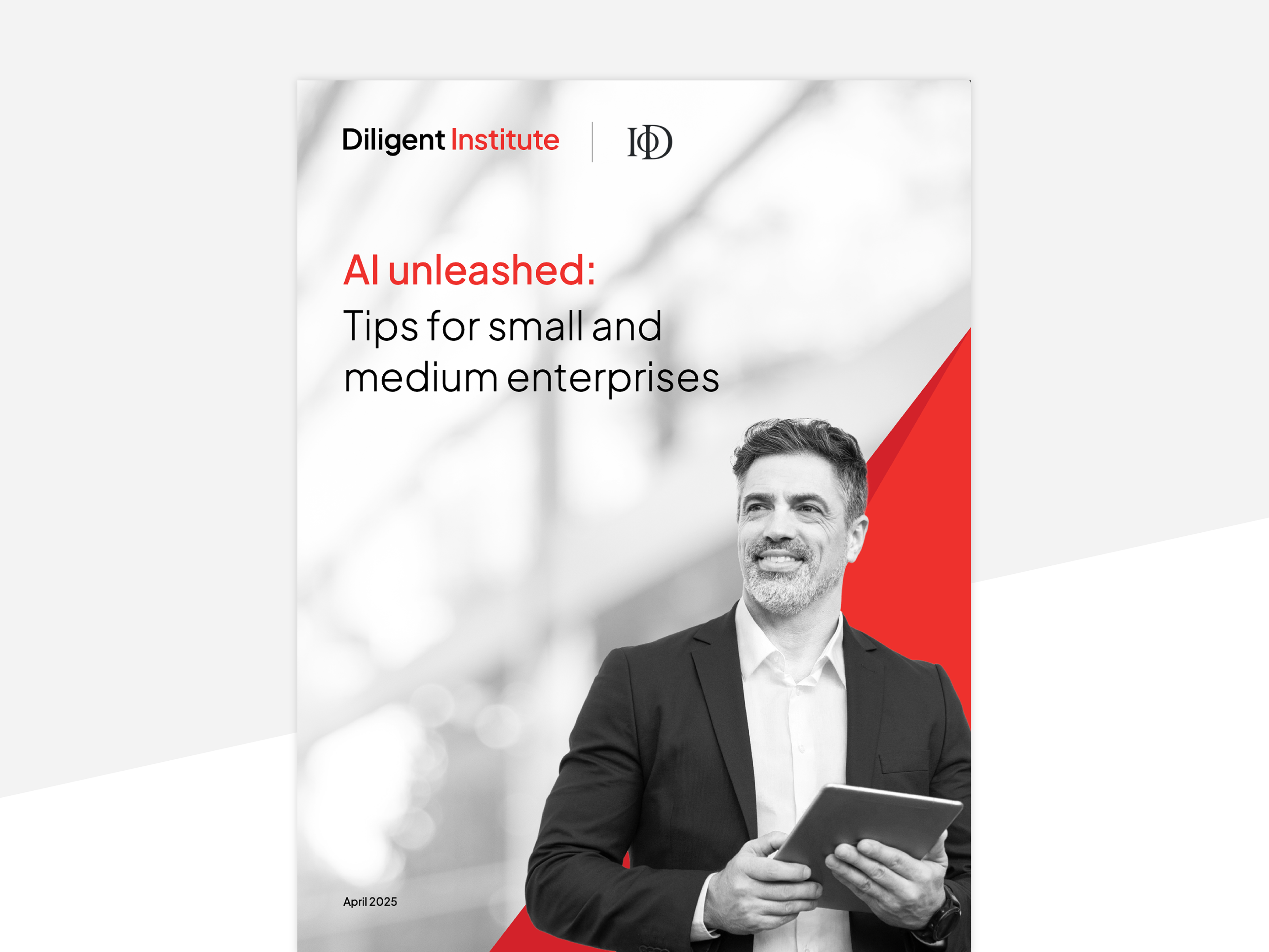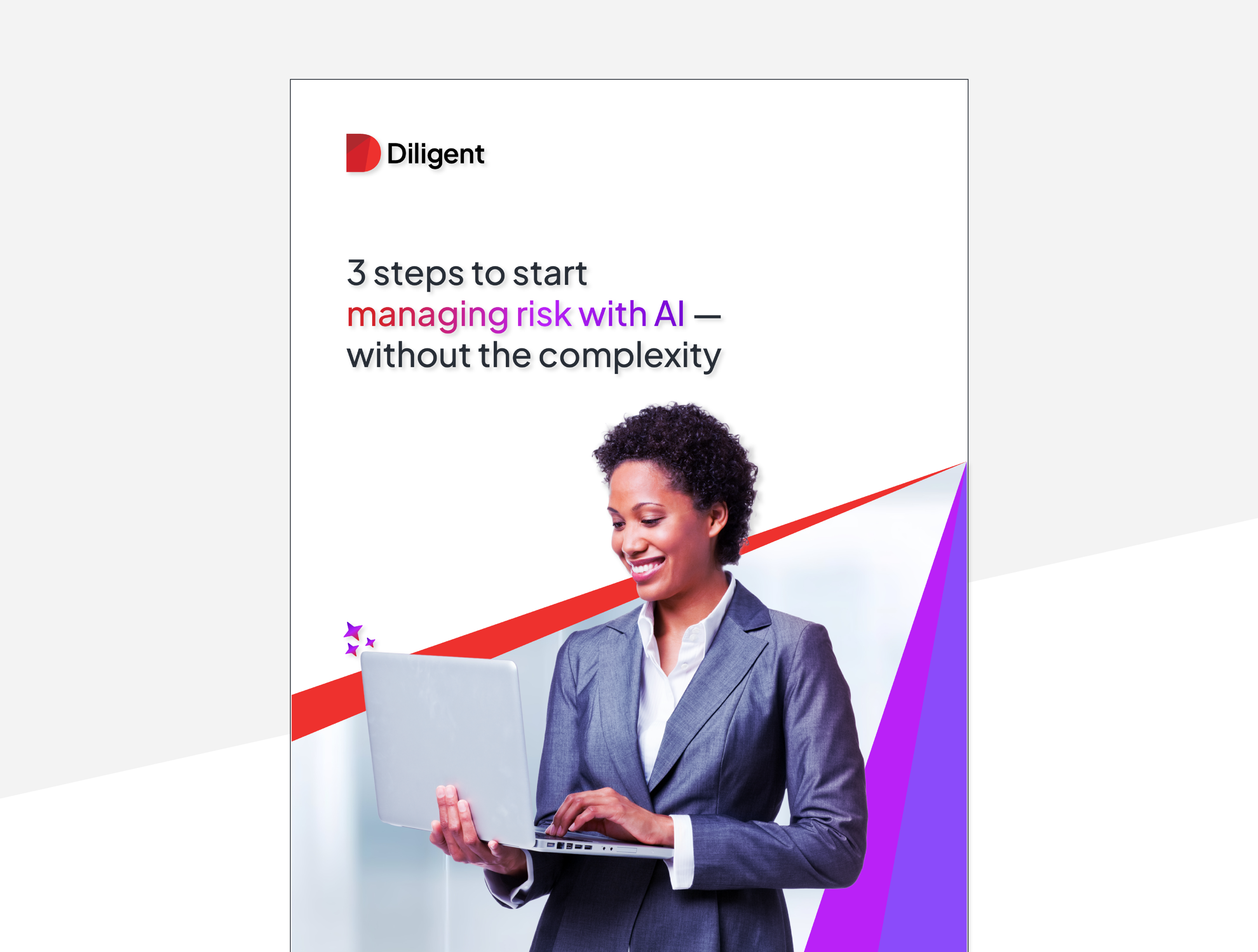
AI status report from the boardroom
In this episode of The Corporate Director Podcast, we sit down with Claudia Allen, Senior Advisor at KPMG’s Board Leadership Center. The conversation delves into survey findings that highlight the current state of AI adoption at organizations and key concerns for directors. Claudia offers valuable advice on staying informed about AI and navigating the evolving regulatory landscape. If you’re looking to learn more about how to navigate AI adoption at your organization, read more here.
Guests

More about the podcast
- The growing interest and challenges in AI within corporate governance
- The impact of AI on strategy, business model, and workforce
- Key findings from a recent survey of directors
Here is an edited transcript of the conversation:
Intro: Welcome to the Corporate Director Podcast, where we discuss the experiences and ideas behind what's working in corporate board governance in our digital tech field world. Here you'll discover new insights from corporate leaders and governance researchers with compelling stories about corporate governance, strategy, board culture, risk management, digital transformation and more.
Dottie Schindlinger: Hi everybody and welcome back to the Corporate Director Podcast, the voice of modern governance. My name is Dotie Schindlinger, executive Director of The Diligent Institute, and I'm joined once again by my co-host extraordinaire Meghan Day strategy leader here at Diligent. Meghan, how are you doing on this fine spring day?
Meghan Day: Great. Dottie, I just stepped out of Diligent’s AI Innovations Virtual Summit so we could record this episode of the podcast.
Dottie Schindlinger:Yeah, what an incredible event. And by the way, folks, if you are listening to this podcast rather than watching our virtual summit right now, that's okay. You can still register.The entire event is being recorded and so you'll be able to watch the replay. I strongly recommend that you do. There are some just great sessions and great speakers across the spectrum of AI. Meghan, what was your favorite session?
Meghan Day: I always love to hear from our customers, and we have a handful that were featured in a panel discussion on how they're using AI in their governance risk and compliance practices right now. And I think that's my big takeaway is, yes I use chat GPT, copilot here and there but it's really upending how organizations can do work. And I think that's so exciting and interesting to see.
Dottie Schindlinger: I think that's an incredible session. Meghan, of course, my favorite session is the AI and corporate governance session that was led by our very own chief legal officer Nithya Das, who's also the general manager of our governance business unit. And she was joined by Pauline Nordstrom, who's a really thoughtful AI leader from the UK. And Samantha Kappagoda, who serves on a number of boards and also is a chief data scientist at another company. And they had a really good, just, get down to business conversation about what is the role of AI in corporate governance and what is it going to do to the corporate governance field? Board roles? What's it going to do to general counsels? What are the risks? What are the opportunities? What do you need to be mindful of? It's a really good conversation, so if you do nothing else, corporate governance fans, make sure to listen to that session and check out the one that Meghan mentioned with our fabulous customers, hearing what they are doing and get some really good practical tips.
Well, Meghan, it's a good segue to talk about all things AI. I, it's a little bit dated at this point, but I feel like we haven't had a chance to talk about it, and it was such a big moment. The memo that came out from Shopify’s CEO, Tobias Lütke, really talking about how he is encouraging everyone across the company or really challenging everyone across Shopify to think first, AI, even to the extent of before you ask for a new hire, why can't this job be done by AI? I know that memo little firestorm here at Diligent, but Meghan, what were your thoughts about it?
Meghan Day: Yeah, I, if you haven't read it, definitely check it out. For folks listening, I think it is a must-read and it's intentionally a little bit provocative in its language I think to light a fire under its employees. But everything in his takeaways really resonated with me, and I will say before asking for more headcount and resources, can AI do this? It's something that I have now asked myself probably daily.
I think the gap for me as a day-to-day employee and sharing this with our board member listeners is really the operationalization of it all. Like I understand the art of the possible with AI. So then if I have an idea on how that could impact my day-to-day job, how do we then get that done inside the company using AI?
And I think bridging that, again, that operational gap, I think, is where company, a lot of companies currently sit.
Dottie Schindlinger: I think that's true. Meghan, something I've been reflecting on a bit and I'd love to talk to somebody who knows a lot more about this than I do. I, certainly no expert here, but I've been giving a lot of thought to this idea of when AI is truly integrated into boardrooms, right?
When that is just table stakes and we're using AI to run every part of the board operations, right? We're using it to get better reporting on what's happening with the company. We're using it to help find. Areas of risk that we need to spend time on and give us a heat map of what's happening in terms of risk at our company, and we're using it to help fuel decisions.
The question for me becomes, does that then become the new standard of duty of care?
Do you know what I mean? Because if I think about it, it's okay, duty of care meant something very different before the internet. You know what I mean? What you could possibly know, the information you could possibly get your hands on so that you could be held accountable as a director for having made the best possible decision in light of the available information.
That's really the way the duty of care is stated. Boy, that seems like it changes to me in the world of AI and I'd love to talk to somebody. Maybe I need to go, talk to my favorite law school professor and just have a good philosophical conversation about this.
But I really wonder if we're going to start to see this being tested. If companies are not leveraging AI tools to make good board decisions, are they going to get themselves in trouble?
Meghan Day: Oh Dottie. We're talking about the end of the world and that, that's my favorite topic here on the Corporal Director podcast.
It just sparks, I don't know. Another plug, if folks haven't read the New York Times op-ed piece from earlier this month, “An age of extinction is coming. Here's how to survive.” I highly recommend it. And agAIn, these are some of the challenging questions that I think boards should be asking, if not them, who.
Dottie Schindlinger: Oh, Meghan here I'm trying to share a whole bright new world. You're talking about the end of this one. Are we going to start to play our typical roles of your doom and gloom and I'm sunny and brightness? Yes. Okay. Folks, nothing's changed here at the corporate Director Podcast, but no, seriously I agree that there are real risks and one of the biggest risks is not paying enough attention. I think frankly, that might be the biggest risk right now because even directors, if you think that your company is not using AI, you are already wrong because I guarantee you there are people working at the company that use it every single day.
You just don't know about it. And so, I think it is incredibly important for directors and every C-suite leader. To get their arms around this as fast as humanly possible. If you're not already there. Come on. We're already, what, three years past the release of chat GPT out into the wild. It’s time.
It's moving really fast. So, you really have no time to waste, no time to lose. And that to me is the biggest risk, is just not. Not paying enough attention and not asking enough questions. And Meghan, we've said many times on this podcast, I think the best questions that directors can ask at the board table are seemingly the most basic, but they're not simple questions.
Things like, what does this technology do? That is a really good question. When it comes to AI, how do we know it does? That is an even better question to ask about AI. And how can we prove that it's doing what we think it's doing is an even better question to ask about AI. And those are all simple questions.
And then that kind of forces the team to answer those questions. How do we know how we're using AI is another good question. So it doesn't, you do not need a degree in data science to ask good questions at the board table. You've just got to make sure that this is on the agenda.
Meghan Day: I hope it is, as you said, Dottie questions that anyone can ask. You don't need a dedicated AI expert, so to speak.
Dottie Schindlinger: No. And in fact, look, you and I have gone back and forth over the years about whether or not you need to have dedicated experts on anything in the board and obviously that decision is going to be wholly dependent on your company. Its stage of development, your industry, your sector, your size.
All those things are going to go into play of who you need to have around the board table. I would say, however, the one thing you do want to make sure is you don't have a boardroom full of people who all look and sound exactly the same, because you're clearly going to be missing perspectives that you need, right?
You need to have that diversity of thought, that diversity of perspective in the boardroom so that you can actually do your work. That said. I think we're finding that unless you have three people who have expertise in an area, it doesn't actually change the outcome of the work of the board.And that was research done by Dr. Peter Weil at MIT and a number of his colleagues. And they took a look to see what does it mean when you have digitally savvy directors on the board. What they found was that when you have one or two, you might see a tiny change, but nothing statistically significant. But once you add the third, you're now outperforming your peers by 35 percentage points.
It's that clear. It is that stark. It's like a cliff. And I think what kind of expertise you have in the boardroom is important. But that said everyone needs to ratchet up their level of understanding of AI. Everyone. It doesn't matter what your job is, doesn't matter what your job was, it's just like cyber people.
We can't not know about cyber. We can't not know about AI. It is just table stakes, I think. Now it's not yet table stakes to have an AI board member, but Meghan maybe that's the next research project for the institute is to find those companies that implemented AI board members and find out how they're doing and see what's going on.
That's a good segue, Meghan, to talk about your interview with Claudia Allen, who's the senior advisor at KPMG's Board Leadership Center. What did you get to talk to Claudia about today Meghan?
Meghan Day:Yeah, they're doing some great research. Along those same lines of what we just talked about, how is AI affecting the boardroom? How are board members thinking about it? How are they adopting different practices? Great. Let's give it a listen.
Joining us on the Corporate Director podcast today is Claudia Allen, senior advisor at KPMG's Board Leadership Center. Thank you for joining us.
Claudia Allen:It's a pleasure to be with you.
Meghan Day: To kick things off, I'd love to know a bit more about you, your professional background, and maybe the work that you're doing at the Board Leadership Center.
Claudia Allen: Oh, great. By background, I'm a corporate lawyer. I was a partner and co-chair of the corporate governance practice at a national firm, and then I came to the board leadership center, which is essentially the firm's think tank on corporate governance. So, I spend a lot of my time speaking to boards,committees individual direct.
There's C-suite executives about the governance issues and challenges they're facing, and obviously during this time of volatility and uncertainty there's no shortage of those issues.
Meghan Day: I would love to spend some time with you today digging into one of those topics that has a lot of complexity and uncertainty, and that is AI, particularly generative AI.
What have you been hearing about how boards are. Wrapping their arms around this?
Claudia Allen: I think there'sgenerally a lot of hunger for education on the subject of gen AI, and I think many directors recognize that in order to oversee something, you need to understand it. So, directors don't need to be experts in gen AI, but they should have a basic level of fluency.
And AI is going to continue to develop and change, and that means ongoing education about AI and as well as subsequent technologies.
Meghan Day: Given how rapidly the technology and its related risks and opportunities are evolving, how are they making sure they have the right expertise at the board level to effectively oversee AI?
Claudia Allen:I think there are lots of questions about do we need an AI director in the boardroom? And I think a lot of boards have a natural inclination not to bring on somebody who's just a narrow domain expertise, but who doesn't otherwise have the ability to meaningfully contribute. So, I think one of the questions is how central is AI to the business?
If it's very central, maybe you are looking for a direct through with this type of expertise, but you also want him or her to have that broader that broader reach. In terms of other issues, a board may confront, and it might be hard to find a person like that, although there are people like that.
But even if you do have an AI, expert on the board. The other directors can't automatically defer to him or her. They need to exercise independent judgment, so they listen to what that director says, as well as other information they get. So, a lot of boards are turning to outside experts, thinking about advisory boards, etcin order to fill the gap in knowledge that may be there.
And as I said before, education plays I think a very major role.
Meghan Day: With that in mind, what are some of the approaches boards are taking when it comes to oversight specifically?
Claudia Allen:I think you start with the question about what should the full board be looking at, and I think there are some basic questions you want a full board to look at.
For example, what will be the impact on the strategy, the business model the workforce, generally those are full board issues, and they should remain full board issues, but some other issues are being delegated to committees will be delegated to committees. For example, the audit committee, but you want to make sure that issues aren't being siloed in a committee, that there's coordination among committees and with the full board.
So when we think about the standing committees, I think eventually all three of them will have some role to play in overseeing aspects of AI. But in terms of the audit committee, I think there are a number of areas that you want to ask about. For example, if the financial department is using gen AI to produce drafts of financial statements or regulatory filings.
That's something the audit committee should look at. The audit committee should also be asking, have our internal controls been updated to take into account this new technology? Data issues. Audit committees often look at compliance with law, and in terms of. Artificial intelligence is a very fragmented landscape, so the committee would need to remain up to date.
ERM is another issue that audit committees often oversee in whole or in part. So you would ask how are Gen AI risks being integrated into the ERM program? And many audit committees already oversee cyber and data privacy. And if so, they would see the related aspects involving gen AI. And when you think about all of that on top of what the audit committee is already doing, it's fair to ask whether the committee has the bandwidth and skillsets.
And I think, that is a fair question that committee should address. The nominating and governance committee would probably look at issues like director education and director skill sets in this area. Comp committee might look at impacts on human capital like upskilling, reskilling, downsizing prohibited uses of gen AI in employment.
And then a minority of boards have a tech committee. It's a small number, but it's increasing most frequently, for example, in tech related companies. But if you're thinking about forming that type of committee, I think you want to ask, do we have directors with the right skill sets? And what exactly would that committee oversee and how would it coordinate with other committees?
Because for example, as I talked about, issues like internal controls would likely remain within the audit committee.
Meghan Day: That's a really helpful breakdown. I appreciate that. I want expand on a survey that the board leadership Center recently conducted of directors to ask boards about the adoption and oversight of AI at their companies. I'd love to hear a little bit more about that survey and some of the key findings.
Claudia Allen: Sure. We surveyed directors in January and February, and we did a similar survey about a year before. So, we also looked at how responses have changed, and I think one of the central findings is about the state of companies as they roll out gen AI.
And in terms of where they are, about 41% of the respondents said their companies were in the selective piloting phase. And that was down from a majority the year before. And I think the reason it down is because other companies are a little bit further along the curve. So we saw about a quarter starting to scale.
GenAI 16% said they're starting to integrate it into strategy, and about 11% said GenAI was central to their business and being robust. And that was notably up from 4% the year before.
Meghan Day: Any other notable or surprising findings in that survey?
Claudia Allen: I have to say I was a bit surprised that there weren’t a few more companies further along in their rollout of gen AI.
And we also saw that only 40% of the respondents said their companies had put them in place. AI risk management frameworks, and I would've hoped that more companies would have those in place. I think that really is an issue that directors should be looking at because it's protective of the company and I really think quite important.
Meghan Day: In our recent research here at the Diligent Institute, directors told us that they actually viewed lack of internal expertise as one of the biggest risks of AI. Does that align with what you saw in your research?
Claudia Allen: When we asked directors about risks, the majority said there the most concerning risk was inaccurate data, and that was followed by inaccurate results.
And that was roughly in line with the prior year. But when we asked them about what the most significant impediments to widespread usage were. Of gen AI, they cited a similar issue to what you found in your report. So, a majority told us that the need for new skills and talent was the most significant impediment, and that was up about 10 points from 2024.
And then almost half cited workforce transformation, meaning retraining reductions as the second most significant impediment.
Meghan Day: So, we talk a little bit about the risks. What about the opportunities? Our survey told us that directors view operational efficiency and workforce productivity as the biggest opportunities presented by AI.
What are you seeing on your end?
Claudia Allen:I think our results were similar in that regard. Over three quarters of the respondent said. Efficiency, productivity and savings were the most significant benefits and were also factors driving investment. And a distant second was new products and services that came in at 12%.
So I think it's fairly overwhelming that the focus is on issues like efficiency and productivity for now.
Meghan Day: Makes sense. Any best and final advice for our listeners?
Claudia Allen: I think as we all know, the pace of change is remarkably rapid. We're now entering the era, or we're in the era of somewhat autonomous agentic AI and that really emphasizes the need for directors to obtain education and ongoing education. Again, you can't oversee something you don't understand. And the other thing I would say is keep an eye on the regulatory landscape. It's evolving, it's fragmented, and this really affects how and where a company may be able to use gen AI. So, it'sa very important issue to focus upon.
Meghan Day: Great suggestions. Claudia, we'd love to ask you a couple of questions to close out here that we ask all our guests. And the first one is, what do you think will be the biggest difference between board rooms today and 10 years from now?
Claudia Allen: It's fairly hard to see into the future, particularly when we're talking about technology and acute levels of disruption. But I do think that because of technology boards will be better informed and they'll be able to obtain deeper insights, and that will help reduce some of the information asymmetry between management, which is, looking at the business every day and the board, which only meets periodically.
Meghan Day: What is the last thing you read, watched, or listened to that made you think about governance in a new life?
Claudia Allen:I'm reading George Stephanopoulos book about the White House situation room and how it's been used by each of the presidents since it was created. And I think that really, made me focus even more on the challenges of decision making during a crisis and with incomplete information.
Meghan Day:That's a great suggestion. Lastly, Claudia, what is your current passion project?
Claudia Allen: I serve on a small committee that has oversight of the corporate law that's followed by a majority of states. So, we update the statute and it brings together a very diverse perspective of lawyers and private practice, general counsels, academics, and judges.
So, it's a really rich and interesting discussion. So that really is my passion project.
Meghan Day: I love that. You're in the company of governance geeks here on this show too so it sounds like a lot of fun. Claudia, thank you so much for taking the time to join us today.
Claudia Allen: Oh, it's been my pleasure.
Dottie Schindlinger: Meghan, thank you so much for that interview. Really interesting to see some of the findings in their paper and how they aligned with some of the things we've been finding in our own research. What stood out for you?
Meghan Day: Definitely. I think efficiencies are a huge opportunity for organizations.
Although, I will say Dottie, I just keep coming back to our conversation earlier about, it is so much more than just efficiencies. There is a real opportunity for this to be a complete paradigm shift.
Dottie Schindlinger: For sure. I think it's not surprising to me that efficiency and cost savings is where companies are starting.
We certainly found that it's tangible. You get it. It's tangible, you can get your head, you can get your head around it. And that's exactly what we found and what directors think this year too. That's where people are starting. That's where they're thinking about.
But there is such an opportunity. And I thought things like the Tobias Lütke memo at Shopify. Just even asking the question every single thing that you do, how can you leverage AI differently or how can you do this differently with AI? Or can AI just automate this for you? That's an interesting starting point.
I don't think it's the ending point. I think eventually youhave to get to something even more innovative, what are the things you can't do right now that AI could do? I think that's where you really must go, but a good entryway in is just toliterally look at everything and figure out, how could AI change the outcome here or how could it change the process or how could it change the approach?
And I think that's an interesting inquiry line of inquiry for board members to have as well. About everything. It is interesting too. We did another paper. We had a round table with a group of directors in the UK in January. And coming out of that, we wrote a paper on their observations.
It was interesting because those directors felt they were a little bit further behind the curve on AI adoption. And they're all from small and medium enterprises. So, they're smaller companies, not big guys. But what was interesting was coming out of that conversation, they came up with a list, a really handy kind of checklist of things you can do just to get started.
And they had some novel things on that checklist. You, by the way, you can wrap, read that paper. It's at diligent.com/resources and it was called, “AI unleashed.” So, if you just search for that, you'll find it. But interesting takeaways, and even those directors who clearly, this might have been the first time they were having this conversation, we're coming up with some really clever ideas.
I think the point is just to have the conversation, just to ask the questions, just to get started. Love it. Meghan, thank you so much for that interview, and I think that wraps up another episode of the Corporate Director podcast. We'd like to say a few special thank yous, first and foremost to our governance and AI expert, Claudia Allen from KPMG podcast producers Kira Ciccarelli, Steve Clayton and Laura Klein, our sponsors for the show, PWC, KPMG, Wilson Sini and Meridian Compensation Partners, and most especially to Diligent for continuing to let us do this show.
If you like our show, please be sure to give us a rating on your podcast Player of Choice five Stars only, please. You can also listen to our episodes and see more from The Diligent Institute by going to diligent.com/resources.
Thank you so much for listening.
Outro:You've been listening to the Corporate Director Podcast. To ensure that you never miss an episode, subscribe to the show in your favorite podcast player. If you'd like to learn more about corporate governance and tools to help directors do their job better, visit www.diligent.com.
Thank you so much for listening. Until next time.

AI Unleashed: Tips for small and medium enterprises
Equip your SME with AI-driven tools to innovate, stay competitive, and meet customer needs effectively

Your guide to AI-powered risk management: 3 steps for growing organizations
Learn 3 simple steps to start managing risk with AI—no complexity, no big team needed.

Incorporating gen AI into business strategy
In this episode of The Corporate Director Podcast, we talk with Sophia Velastegui, a renowned advisor on AI business strategy with experiences at Microsoft, Google, and Apple.
